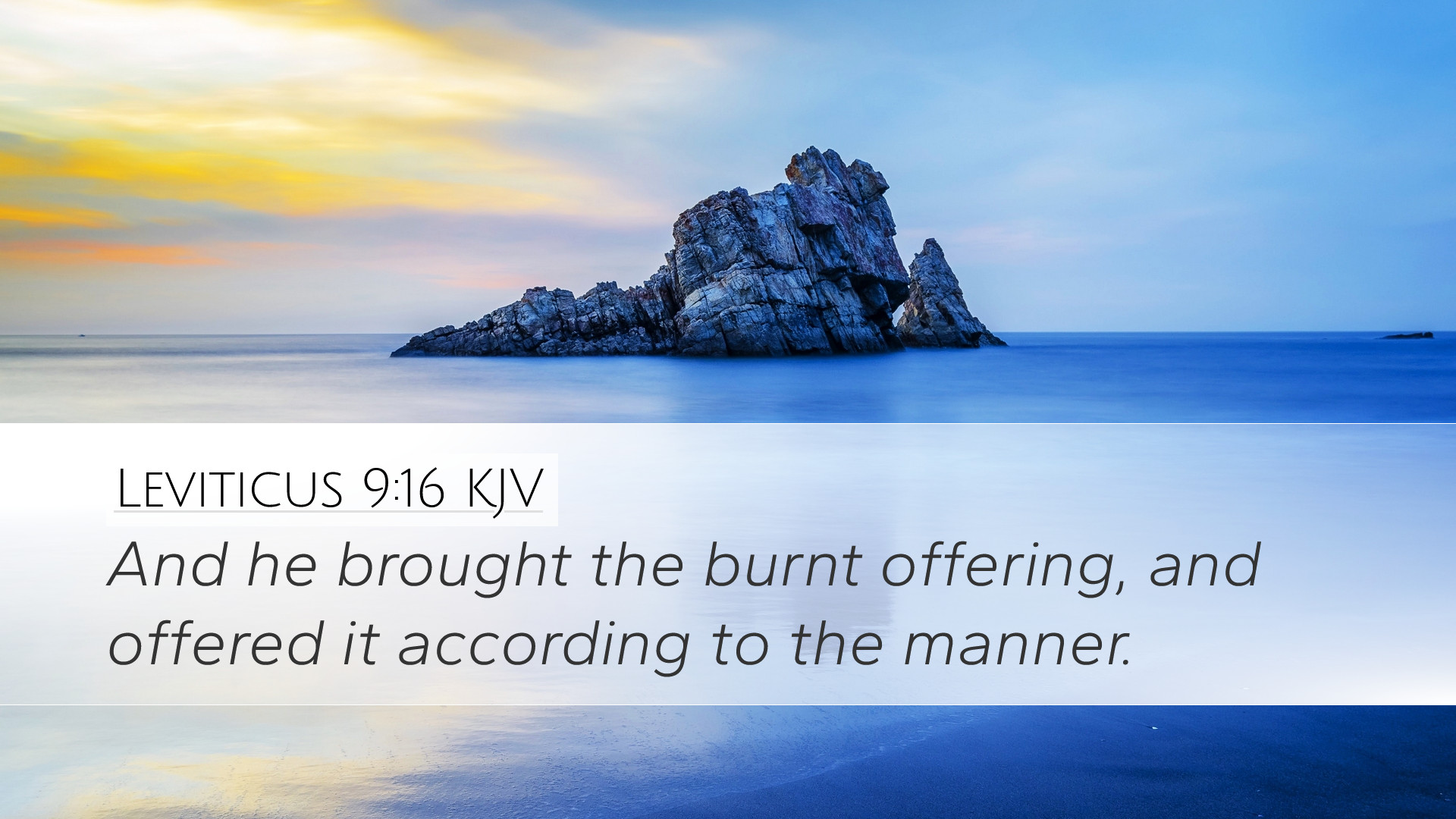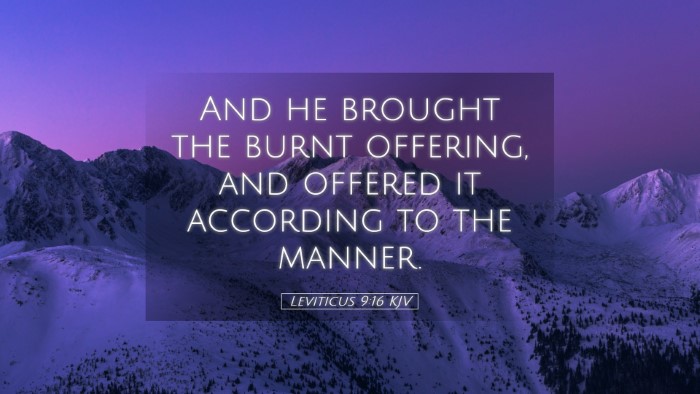Bible Commentary on Leviticus 9:16
Text of the Verse: "And he brought the burnt offering, and offered it according to the manner: and he brought the meat offering, and offered it according to the manner." (Leviticus 9:16)
Introduction
This verse encapsulates the essence of the sacrificial system established for the Israelite community. It demonstrates the adherence to divine instructions in offering sacrifices, highlighting the importance of obedience and ritual in worship. In this commentary, we delve into insights drawn from esteemed public domain commentaries.
Contextual Overview
In Leviticus 9, we find the culmination of Moses' and Aaron's preparation for the inauguration of the priesthood. This chapter marks a significant moment in Israel’s history, where God first manifests His glory in response to the sacrificial offerings of the priests. Leviticus 9:16 contributes to the narrative by detailing the offerings presented, reinforcing the themes of dedication and compliance to divine specifications.
Exegesis of Leviticus 9:16
Matthew Henry, in his famous commentary, highlights that the burnt offering and the meat offering symbolize two aspects of worship. The burnt offering represents complete surrender to God, while the meat offering serves as an expression of thankfulness and acknowledgment of God’s provisions. Such offerings were essential for maintaining communion with God.
Significance of Burnt Offerings
According to Albert Barnes, the burnt offering is unique in that it signifies total burnt sacrifice. The entirety of the animal was consumed by fire on the altar, symbolizing total dedication and the worshipper's unreserved devotion. This practice serves as a foreshadowing of the ultimate sacrifice of Christ, thereby drawing a profound connection between Old Testament rituals and New Testament fulfillment.
Meat Offerings Explained
Adam Clarke elaborates on the meat offering, stating that it typically consisted of fine flour, oil, and frankincense. This offering is an act of gratitude and recognition of God’s bounty, showcasing the worshipper’s acknowledgment of God’s blessings and sustenance. The oil signifies the presence of the Holy Spirit, enhancing the offering's spiritual significance.
Ritual and Order in Worship
This verse’s phrase "according to the manner" indicates the importance of ritual compliance. Obedience to God's prescribed methods of worship is a recurrent theme in Levitical law. Both Henry and Barnes stress that God desires order in worship, suggesting that deviating from the prescribed offerings would reflect a lack of reverence for God’s holiness.
Theological Implications
The offerings mentioned in Leviticus 9:16 carry deep theological implications. They serve as types that foreshadow New Testament truths found in Christ. The burnt offering alludes to Jesus’ complete sacrifice for humanity's sins, reinforcing the concept of total commitment to God. Similarly, the meat offering corresponds with our response to God’s grace through acts of gratitude and service.
Obedience and Worship
One of the essential themes that emerges from this verse is the relationship between obedience and worship. Matthew Henry notes that the act of bringing offerings according to the manner reflects an understanding of God’s holiness and the needed reverence during worship. The adherence to ritual signifies a heart aligned with God’s will.
Application for the Church Today
The contemporary relevance of Leviticus 9:16 lies in understanding how offerings, in various forms, manifest in the life of believers today. The church is called to embody these principles through worship, service, and sacrifice in alignment with God’s will.
- Worship: Recognizing the need for structured worship that honors God.
- Service: Engaging in acts of service as a response to God's grace.
- Commitment: Offering our lives as living sacrifices, devoted to God’s purposes (Romans 12:1).
Conclusion
In conclusion, Leviticus 9:16 encapsulates the heart of worship through obedience and ritual. Drawing from the insights of Matthew Henry, Albert Barnes, and Adam Clarke, this commentary explores the depth of meaning in the burnt and meat offerings and their implications for the believer's life today. As we reflect on this passage, let us strive to offer our lives fully to God, embracing the richness of worship and commitment befitting His glory.


